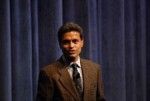Fareed Zakaria Speaks on Global Economy in Crisis

The Brehmer Theater was packed to capacity on Wednesday as the Colgate community gathered to hear the inaugural Lampert Lecture, “The Future of Liberal Democracy,” by one of the world’s foremost minds in international relations, Fareed Zakaria.
Zakaria is the editor of Newsweek International and recently started a weekly program for CNN called Fareed Zakaria: GPS.
The afternoon began with an address from Professor of Political Science Stanley Brubaker, who serves as Director of the Institute for Philosophy, Politics and Economics (PPE), the sponsor of the event. He explained how appropriate Zakaria was to the PPE’s current theme, “Liberal Democracy and Its Limits.” Brubaker introduced Ed and Robin Lampert, who have endowed a lecture series for the PPE, of which Zakaria’s was the first.
“There has never been a better time to talk about the philosophy of politics,” Ed Lampert ’62 said.
“It is a cold day for someone who grew up in Mumbai, India, but it is a pleasure to be here just the same,” Zakaria began.
He first introduced his main theme for the lecture, which was that, “strangely, this [global economic crisis] is a product of success,” and that, “the challenge of the future is managing … success.”
He said that the roots of current international relations lie in the year 1979, “the year that the old world ended and the new world began.” He described how the world order then was a spectrum of global power with the United States on one end and the Soviet Union on the other. Nations, he said, were forced to choose one power to align themselves with. When the Soviet Union fell, which Zakaria attributed to the Soviet invasion of Afghanistan, a move he called, “the worst mistake in [their] history,” the entire world order was shaken up. Nations that had formerly sympathized with the Soviets were forced to adopt the “Washington Consensus.”
In the wake of this “seismic economic and political event,” trade among nations was opened up concurrently with the Information Revolution. The most important consequence, Zakaria said, was that people could view prices from all over the world, eliminating vast price disparities and solidifying the singular global market.
He said that this market soon became nearly all-powerful.
“This is the first truly global financial crisis,” Zakaria said. “Everyone is connected but no one is in control. The metaphor of the internet applies.”
Zakaria then went on to a discussion about U.S. militarism and the Middle East.
“In the past, the British had what was called the ‘two navy rule,’ where [they] would have a larger navy than the next two [world] navies,” Zakaria said. “The U.S. military is larger than the next 28 militaries and as large as the rest of the world’s militaries in terms of defense spending.”
Zakaria explained that the last “20 or so” years have been a period of not only economic growth but also general political stability, at least as far as the United States is concerned. This is another result of the fall of the Soviet Union. This peace, he said, has led to general American overconsumption, and has thus had a large impact on the world economy.
“We have accepted this … peace and prosperity and we’ve done very little with it as a world,” Zakaria said. “What we have created is a high-speed, very dangerous race car moving at speeds that it never has before. … Americans have consumed more than we could produce for the last twenty years, and have made it up by borrowing. … [Countries such as China] were over-saving while we were overconsuming.”
Zakaria then spoke about just why it is that no one can get Americans to stop overconsuming.
“The reality [is] that we live in open, responsive governments,” Zakaria said. “No one wants to be the one to say, ‘You can’t.'”
He explained that the policy of Alan Greenspan, the Federal Reserve Chairman from 1987 to 2006, was to cut interest rates at every problem, “to keep the good times rolling,” something that was “very much a part of the culture.”
He made a joke about Greenspan’s fiscally conservative predecessor, Paul Volcker, being the one to “take away the punch bowl before the party even begins,” and Greenspan being the one to,”put vodka in the punch bowl.”
He said that the current global financial crisis has caused a dangerous decrease in global trade, and that the notion that the crisis would cause global cooperation has, in fact, been the opposite of reality. The current mantra “Buy domestic,” is being echoed all over the world with countries trying to stimulate their own economies at the expense of supporting others, something that has troubling implications for America, whose only area of growth recently has been exports.
“If Germans are saying, ‘Buy German,’ and the Brits are saying, ‘Buy British,’ and the French are saying, ‘Buy French,’ then no one will buy American,” Zakaria said. “This sends the countries of the world into a protectionist tailspin.”
The problems, Zakaria said, were globalized, so relief will come if we can “find a way to get the solutions globalized.”
He then shared his humorous method for predicting the effects that the burgeoning economies and populations of India and China will have on the world, something he called, “Zakaria’s Law of Mathematics.”
“Take any number and multiply by 2.5 billion,” he said.
This means that it is necessary to think of India and China when imagining solutions to global climate change.
“[Combined, India and China] will open one coal-fired power plant per week over the next ten years,” Zakaria said. “We can put all of those nice twirly light bulbs everywhere and we can all drive a Prius, but China just ate that for breakfast and India just ate that for lunch.”
Turning back to the economy, he mentioned that the only country with no financial crisis is Canada, because while America was loosening its regulations to keep prosperity going, Canada followed more conservative policies.
“They left shock absorbers, and we didn’t,” Zakaria said. “With a fast-moving car, you need shock absorbers.”
He ended his lecture with the comment that America spread the idea of opening up to a global economy before many others, and that, “just as the world is opening up, we are closing down.”
He said that a future historian might say about America that, “It globalized the world, it just forgot along the way to globalize itself.”
The lecture was followed by a question-and-answer session and a reception with Zakaria in the Dana Arts Center lobby.
“I thought he was very well-spoken and really interesting,” sophomore Liz Grover said. “He knew how to talk to us on our level. I thought it was interesting how he described the world becoming protectionist and that all of our solutions need to be accomplished by working together.”
“I think that the most incredible thing about him was that he was so humble, down-to-earth and witty,” senior Christopher Nulty said. “He understands the issues that college students are interested in. It starts with what Ed Lampert said. There really has never been a better time to study the philosophy of politics. I also think it’s good to remember that the financial situation hasn’t come from bad things but from too much of a good thing.”







